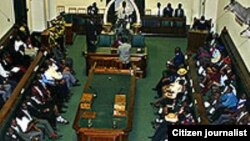Civic organizations have commended the gazetting of the Human Rights Commission Act saying it is a necessary step towards the much-needed reforms in Zimbabwe.
The Human Rights Commission Bill was signed into law last Friday, giving it legal mandate and powers to protect and prosecute people suspected of violating human rights.
The constitutional body will now investigate alleged human rights violations that occurred after Febuary 2009, a section of the act long disputed by civic society and the Movement for Democratic Change.
The Zimbabwe Lawyers for Human Rights welcomed the gazetting of the commission, adding that it should carry out its mandate without fear or favor.
In a statement, the organization encouraged the "ZHRC to immediately commence its operations and ensure that a strong and professional secretariat is established to assist in the implementation of its strategic plan and the fulfillment of its constitutional mandate."
It challenged the commission to play its part in guaranteeing the enforcement of its mandate as Zimbabwe's democratic process is in full swing with the constitutional referendum and proposed elections on the horizon.
Senior researcher Tiseke Kasambala of Human Rights Watch also commended the gazetting of the law but called into question the timeline for investigations.
Kasambala said Zimbabwe needed to investigate human rights violations that occured in 2008, under Operation Murambatsvina and the massacre of at least 20,000 by the Fifth Brigade.
Meanwhile, President Robert Mugabe, Prime Minister Morgan Tsvangirai and his deputy Arthur Mutambara condemned Justice Minister Patrick Chinamasa’s recent statement Monday that Zanu PF will never accept a Tsvangirai victory in the next elections.
Chinamasa insinuated in an interview with the British Broadcasting Corporation last week that his party and the army will never accept a leader like Mr. Tsvangirai whom he said was being used to further western interests at the expense of ordinary Zimbabweans.
MDC spokesman Douglas Mwonzora of Prime Minister Tsvangirai’s MDC formation told reporter Jonga Kandemiiri that the three principals to the Global Political Agreement were in agreement that Chinamasa’s statements were in bad taste.
But Zanu PF spokesman Rugare Gumbo said Minister Chinamasa might have said these words in his capacity not as a party position.
The Human Rights Commission Bill was signed into law last Friday, giving it legal mandate and powers to protect and prosecute people suspected of violating human rights.
The constitutional body will now investigate alleged human rights violations that occurred after Febuary 2009, a section of the act long disputed by civic society and the Movement for Democratic Change.
The Zimbabwe Lawyers for Human Rights welcomed the gazetting of the commission, adding that it should carry out its mandate without fear or favor.
In a statement, the organization encouraged the "ZHRC to immediately commence its operations and ensure that a strong and professional secretariat is established to assist in the implementation of its strategic plan and the fulfillment of its constitutional mandate."
It challenged the commission to play its part in guaranteeing the enforcement of its mandate as Zimbabwe's democratic process is in full swing with the constitutional referendum and proposed elections on the horizon.
Senior researcher Tiseke Kasambala of Human Rights Watch also commended the gazetting of the law but called into question the timeline for investigations.
Kasambala said Zimbabwe needed to investigate human rights violations that occured in 2008, under Operation Murambatsvina and the massacre of at least 20,000 by the Fifth Brigade.
Meanwhile, President Robert Mugabe, Prime Minister Morgan Tsvangirai and his deputy Arthur Mutambara condemned Justice Minister Patrick Chinamasa’s recent statement Monday that Zanu PF will never accept a Tsvangirai victory in the next elections.
Chinamasa insinuated in an interview with the British Broadcasting Corporation last week that his party and the army will never accept a leader like Mr. Tsvangirai whom he said was being used to further western interests at the expense of ordinary Zimbabweans.
MDC spokesman Douglas Mwonzora of Prime Minister Tsvangirai’s MDC formation told reporter Jonga Kandemiiri that the three principals to the Global Political Agreement were in agreement that Chinamasa’s statements were in bad taste.
But Zanu PF spokesman Rugare Gumbo said Minister Chinamasa might have said these words in his capacity not as a party position.








